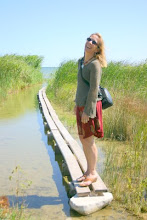Say a combine is rolling down the wheat fields. The combine uses an ungodly amount of gas and the exhaust it spews into the air is noxious, but hey, bread's good, especially freshly baked whole wheat spread with real Dairyland butter and dripping with sweet golden stickiness compliments of the mysteriously disappearing honeybee. The combine is rolling through the wheat fields.
But something goes wrong. Something's amok. The combine starts bucking like a rodeo horse, its powerful cutting tools gouging into the precious soil of our American farmland. It lurches across the rich loam of old Iowan riverbeds, the vast stretches of the Great Plains still alive with memories of the Dust Bowl, the arid eastern flatland of Colorado, where farmers are starting to think maybe windpower is what their land supports best, not corn for cattle or even corn chaff for ethanol. The combine grinds through the landscape of the heartland. The driver's thrown out and ends his life as another agricultural mortality. His wife, running to his aid, hearing his final lamentation piercing the roar of rogue machinery all the way into her kitchen, is also, we must regrettably note, chewed up by the wild and rampaging machine when she tries to extricate him. Sons, hired hands, daughters, brothers-in-law and kind and concerned neighbors: none can stop the machine it seems. It goes beyond the borders of this one farmer's land and continues wreaking its havoc in one neighboring field after another. Aghast, tired, and helpless, the community takes shelter and watches from porches, drinking cider on a early Fall evening.
But, behold. A lone rider comes over the horizon, riding the finest steed anyone on the porch has ever seen, chaps of finest leather, saddle studded with an uncanny amount of gemstones. "Help is on the way!"the tall, bald man shouts, waving a copy of a 3-page memorandum overhead. Soon enough, he is followed by a stampede of 435 men and women in suits. They come within sight of the rampaging combine, then throw up their hands, spin on their heels, and race back over the visible edge of the known world. The neighbors look to one another in uncomprehension. They bring out the harder cider, the one with the raised alcohol content. Hard times call for hard measures. Another posse draws near as the sunset begins to intimate the end of day here in the American heartland. Ninety nine members strong, they ride with a sense of majesty unimaginable to the representative gaggle that preceded them.
And what do they do? They fuel up the combine, shake hands all around, and ride away. The combine continues lurching its destructive path across the heartland. The people on the porch, having finished the cider, have now turned to moonshine.
I would like to thank Wisconsin's great Senator, Russ Feingold, for continuing to stand up for what is truly right, for valuing good decisions over fast decisions, for representing my children and me with such calm and intelligence. The bill passed yesterday by the U.S. Senate not only failed to address the causes of our crisis; it actually added to the debt load carried by American taxpayers and deepened our national credit crisis.
My choice of an agricultural metaphor/parable is not entirely arbitrary. One, this is a Wisconsin blog, after all, a little slice of life from the Midwest, so you must expect things like agriculture to surface from time to time, but there are interesting asides here, as everywhere, like the fact that forty-nine percent of farm accidents involved a discernible factor of haste. Does this sound relevant? Additionally, as the website www.calaged.org informed me this morning, "The high accident rate in agriculture is not an accident; it is rather the predictable consequence of specific management choices."
Subscribe to:
Post Comments (Atom)
































No comments:
Post a Comment